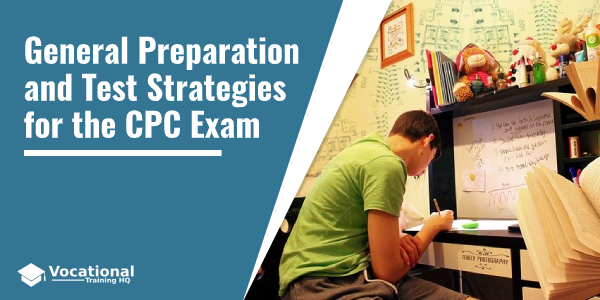There are many preparation materials for the Certified Professional Coding (CPC) exam provided by the AAPC.
They are available on their website, but they are relatively expensive.
Everything you need to know to pass the CPC exam can be learned at a community college or university.
The AAPC training materials are necessary only if you are far out of practice.
However, consider taking CPC practice exams provided by the AAPC.
Article Table of Contents
Prep Strategies
The CPC exam covers numerous topics, so it’s easy to get overwhelmed while you are preparing.
There are a few ways that can help you cope with this large examination.
You will use the CPT manual during the exam a lot.
There are questions related to HCPCS and ICD-10-CM codes, but the majority of questions focus on the CPT code set.
So it’s a good idea to put the most effort to study this code set.
You should know this manual back to front and be able to navigate it and its appendices.
Most people sit for the exam when they already have some experience in coding.
To obtain the certification, you need a passing score and two years of experience or equal educational background.
If you have this experience, you should be familiar with anatomy, physiology, and medical terminology.
However, it’s still recommended to take some review courses to refresh the knowledge.
The exam includes questions that reference anatomical or medical terminology.
So having a strong vocabulary in the medical field will help you understand the questions.
After your studies, be sure to pass as many practice exams as possible.
Think of them like real exams: study hard for them, organize yourself and note which and what type of questions you get wrong.
Did you have trouble with Anesthesia codes?
Go through that section again.
Many private companies provide practice CPC tests, but the ones from AAPC are the best.
Don’t think that practice exams are a waste of time or formality.
Many of these tests will be easier than the actual exam, but you should treat them seriously.
Try to score at least 80% on a practice test before taking the real examination.
Taking the Test
When you take the exam, you may bring all the code manuals you need with you.
You can have notes in the margins in them, but they shouldn’t contain any information specific to the test.
You can’t tape anything into the manuals.
You can mark, though, frequently used or important sections.
For instance, the CPT manual includes multiple tabs in the book to mark particular places.
Use them to mark where the section begins and where to find specific appendices.
When taking the exam, you will be asked to perform as if you were coding at your job, so you should organize the manual in a way that makes sense to you.
Also, keep in mind that there’s a lot of other helpful information in the manuals besides the codes.
The CPT manual includes a variety of diagrams of the human body, such as illustrations of the ocular system, nervous system, adnexa, etc.
Mask these pages too and refer to them when you come to questions on anatomical terminology.
Time Management
The CPC exam consists of 150 questions and lasts for almost six hours.
So you should break things down to make them manageable.
You can divide questions into blocks of time and work on one block for a particular time before moving on.
For instance, you can break it down into five groups with 30 questions each.
Spend one hour for every section.
Alternatively, you can try to dedicate 20 minutes to every 10 questions.
As soon as this time has passed, move to the next group.
For example, if you break it down by five groups of 30 questions, and at the end of the hour, you’re at question #25, skip to question #31.
Then, if you finish another block sooner, you can go back and work on the questions you skipped.
In such a long exam, you should keep your momentum as you move on.
You don’t want to spend too much time on one question.
Try to aim at reading and possibly answering every question.
You can bring a timer with you, a watch or a kitchen timer.
Just ensure that the alarm on it is not distracting.
Obviously, you won’t be allowed to use your phone.
Know Your Goals
You need to score 70% or more to pass the CPC exam.
Keep that in mind during your test.
The long questions that require you to look up multiple codes are worth the same as general questions.
So if you are stuck, don’t be afraid to skip a question and get back to it later.
Another way to manage your goals and time is by remembering that your objective is to choose the best answer from the available ones.
The test doesn’t include the exact duplications of everyday coding instances.
These situations are hypothetical that could have been simplified or shortened.
If you focus too much on details of every question, you’ll lose precious time.
Pick the most fitting answer and move on.
Keep in mind that you can get 45 questions wrong.
Don’t spend too much time on a question that confuses you completely.
Instead, it’s better to try getting easier and less time-consuming questions right.
If you have extra time, you can go back to those complex questions after you answered the easier ones.
Read the full guide: How to Become a Medical Biller and Coder


